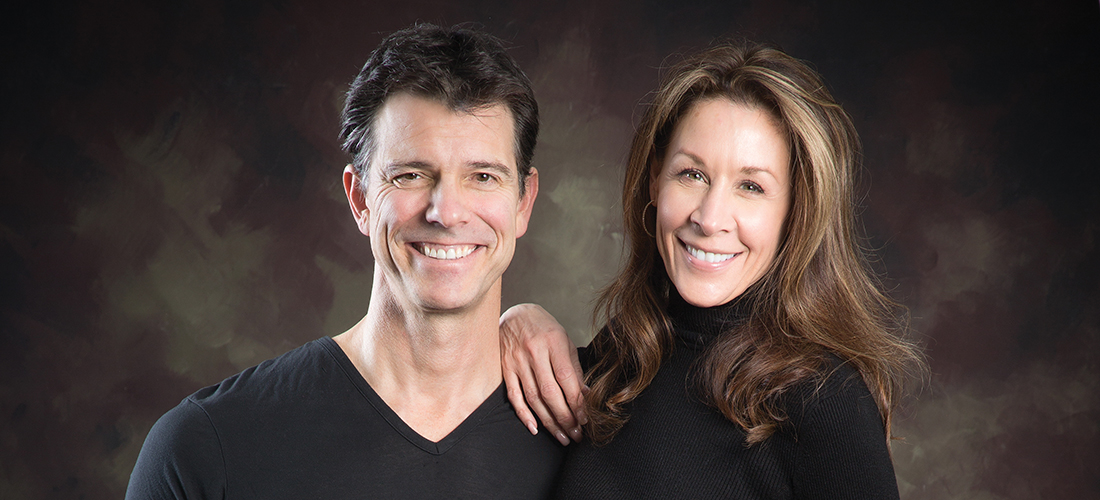
Soliloquies in the park
By Jim Moriarty • Photograph by Tim Sayer
Midsummer will come early to Pinehurst’s Village Green when William Shakespeare gets a curtain call in Tufts Park. After last summer’s three-night run of Much Ado About Nothing, Jonathan Drahos, Carolanne Marano and the Uprising Theatre Company return on back-to-back weekends with A Midsummer Night’s Dream. The 7:30 p.m. shows will be June 1-3 and 8-10. Instead of groundlings paying a penny to stand in the yard of the Globe Theatre, all you’ll need is a blanket or a lawn chair. “Our big thing is to keep it free,” says Marano.
“One of the reasons we decided to do two weekends this year is we want to grow,” says Drahos, an associate professor and the director of the theater at the University of North Carolina-Pembroke. “We want to get the community used to this ongoing thing, that it’s not a one-off. But, also, if it rains one weekend, it’s not a total bust.”
Last year after two flawless nights, bad weather arrived on Sunday. “It started raining in the morning and we thought, ‘OK, we’re going to have to cancel the show,’” says Marano, who teaches choreography and stage dance at UNCP. “We went out there and people had camped out. So we had everybody move closer to the stage and we didn’t use any mics. We didn’t have any electrical and, at one point, two cars pulled up and showed their lights so we could still act. When it got a little unsafe we called it. We went as far as we could. If the audience is willing to weather the storm, then so are we. It was actually a lot of fun.”
The park is the perfect place to stage A Midsummer Night’s Dream, Shakespeare’s best-known comedy. You’ve got Athenians, fairies, weddings and craftsmen. Add a little love potion and what could possibly go wrong? “Lord what fools these mortals be!” says Puck, who will be played by Carolanne.
“It’s Shakespeare’s only truly original play,” says Drahos. Though threads trace back to Chaucer, Ovid and even some medieval romances, “there isn’t a lot of source material he drew from like he does from other plays. Although elements of it are derived from Ovid’s Metamorphoses, and certainly the Pyramus and Thisbe play-within-the-play is sort of lifted from Ovid but the cosmic scope of the play is original. That’s what makes it, to me, special.”
Midsummer begins with the Duke of Athens, Theseus, set to marry the Queen of the Amazons, Hippolyta. A group of craftsmen has gone into the woods to practice their bumbling, crude and comic version of a play — Pyramus and Thisbe — to perform at the wedding. Determined to defy an arranged marriage, Hermia and Lysander also flee into the woods. As luck would have it, the forest is filled with fairies. The couple is pursued by Demetrius, the prospective husband so designated by Hermia’s father, and Helena, who loves Demetrius and seeks to win his favor. Oberon, the king of the fairies, has his own problems. He sends his hobgoblin, Puck, in search of a flower that contains a juice that, when dropped on the eyelids of any sleeper, will make that person fall in love with whomever they see on first awakening. Hijinks ensue.
“If you look at the grand scope of Shakespeare’s works, all of the language is miraculous,” says Drahos. But, on occasion, it can be a bit daunting. “There’s a way that Jon’s training will get the actor to say it so the audience doesn’t feel like it’s a foreign language,” says Marano.
“So much of the language that Shakespeare used, we still use today, 95 percent of it basically. It’s the way Shakespeare put it together that is rhetorically complex, and that’s what makes it eloquent and beautiful and poetic,” says Drahos. “What we end up doing is a collaboration with the audience, saying, ‘We understand that you’re not going to get 100 percent of what we’re doing. We’re going to make 75 percent understandable, and if you meet us halfway with the other 25 percent, you’re going to forgive the rhetorical complexity of the language.’ This is the problem I think a lot of companies have with Shakespeare — they’re sort of elitist. They want the audience to come to them where we are trying to come to the audience. Meet them halfway.”
Drahos and Marano, both 51, met as undergraduate students at Cal State Long Beach when they were performing in David Mamet’s Edmond. Carolanne is originally from Philadelphia, by way of Wichita, Kansas, where her father was an executive for Pizza Hut. She trained in classic ballet at Pennsylvania Ballet, San Francisco Ballet and Ballet West until an injury propelled her career in a slightly different direction. Jonathan grew up in the San Fernando Valley but spent most of his early years in Huntington Beach, California. After graduating from Long Beach they moved to Kansas City where Jonathan got his Master of Fine Arts degree in acting and directing from the University of Missouri-KC. “I was looking for a program that focused on Shakespeare and that was steeped in the classics because that was my lifelong passion,” says Drahos.
From there it was off to New York City. Marano wrote a comedy, At the Threshold, which they produced off-Broadway at the Judith Anderson Theatre on 42nd Street, essentially launching the Uprising Theatre Company. Seven years later, they switched coasts, moving to Los Angeles. During their 10 years in L.A., they produced Carolanne’s play at the Fremont Centre Theatre under the title How Our In-Laws Ruined Our Wedding. Then, while Jonathan was doing a Shakespeare festival in Santa Barbara, a temporary teaching position opened at Cal State Northridge. He fell nearly as much in love with teaching as he was with Shakespeare, and soon they were off to England for Drahos to acquire a Ph.D. from the Shakespeare Institute at the University of Birmingham. From there he was hired by Southern Oregon University, which is where UNCP found and recruited him in 2014. All in all, it’s no less complicated a trail to Shakespeare in the park than Lysandra and Hermia take into the woods.
A Midsummer Night’s Dream has a substantial cast. The tall, lean Drahos will be playing Oberon, while the slight ballerina, Marano, is Puck. “We’ve been working on the physicality of the Puck/Oberon relationship. She’s going to be climbing on me a lot, sort of almost attached spiritually,” he says. For other roles, they’ll rely on theater students from UNCP, in addition to outside actors, some local. “Also, we look in New York and L.A. because we do like to bring in professionals so that the students can learn from them,” says Marano. The theater company fundraises to pay for the production and any outside talent. That fundraising effort includes the sale of a limited number of tables — with cheese and wine — for the Friday and Saturday night performances.
“Actors like to work,” says Drahos. “With Shakespeare, it’s not about the money necessarily. But if you can get paid to do Shakespeare, it doesn’t get any better for a real actor than to have that scenario. Especially in such a beautiful setting in Pinehurst, during the summer, outdoors.” PS
Jim Moriarty is senior editor of PineStraw and can be reached at jjmpinestraw@gmail.com.





